2011 Yamaha VXR Review
Run with the big guns...for thousands less
Affordable performance.
That was arguably Yamaha’s primary goal with the new VXR, a craft that borrows heavily from existing models to create a surprisingly new-feel ride in the WaveRunner lineup. Exploiting the time-honored ratio of horsepower-to-weight, Yamaha has unleashed a craft that will flirt with the 68 mph mark, yet not require a supercharger. And it will do it for a mere $11,199, a price that is literally thousands less than boats in the Yamaha lineup (and industry as a whole) that hit similar top speeds.
Cheap speed will undoubtedly make the boat an instant winner to many. But as I discovered during a recent test ride, the VXR is far more than just a one-trick pony.
Get the Flash Player to see this player. |
Nano VX, Simpler 1.8
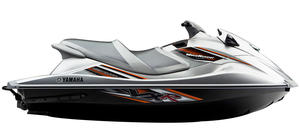 The VXR takes its hull from Yamaha’s entry-level VX line.
The VXR takes its hull from Yamaha’s entry-level VX line.As the name suggests, the hull in question is the VX. At first glance, that may seem an odd choice for a speedster, as the VX graces Yamaha’s lowest-priced, introductory models. Many industry observers, however, have long speculated that this hull could handle some power. It has a predictable yet aggressive feel that, to those with a little vision, has long rivaled the higher-end offerings in Yamaha’s line.
Still, it needed a little tweaking to handle the power that was to come. Much of that — modifications to the pump inlet and tweaks in the deck — were accomplished last year, changes that Yamaha reps claimed were meant to improve ergonomics and comfort on the existing VX models but in actuality were prepping the boat to receive the industry’s largest displacement engine (more on that shortly). Added to those changes this year were additional modifications, including fine-tuning the placement of the craft’s sponsons, critical as the center of gravity had now been affected.
But perhaps the biggest change for the VX hull was the switch to NanoXcel, Yamaha’s proprietary construction material that resulted from nano-technology engineering of the Sheet Molding Compound (SMC) used to form Yamaha hulls. According to Yamaha, NanoXcel’s strength exceeds conventional SMC or FRP construction, while lowering the overall weight substantially. The VXR weighs in at only 728 pounds, lighter than even the VX Deluxe… and for that matter, just about any other production three-seater on the market.
Now let’s get back to that engine. At 1,812cc, it’s the largest displacement powerplant in the industry, though it’s engineered into a surprisingly compact overall footprint. Perhaps more importantly, it’s got the overall size to produce plenty of power without the need for a supercharger. No supercharger means no supercharger worries, no supercharger price hit, and no supercharger fuel bill.
What to expect? During my test runs on a cool Fall morning outside Atlanta, I recorded a top speed of 67.7 mph in light chop, and a crisp acceleration that should fall in the 1.8-2.0 second mark from 0-30 mph. Yes, this was a pre-production hull, but Yamaha appears confident the production version will hit the same targets. At least in terms of top speed, that’s right in line with the fastest craft in the industry at the moment.
Wild Ride
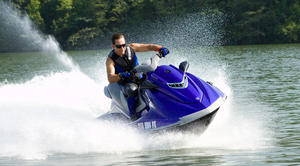 With so much power available in such a lightweight package, the VXR is begging to play around.
With so much power available in such a lightweight package, the VXR is begging to play around.And it feels that way. Pin the throttle and the craft leaps out of the water. Experienced riders will get their weight forward over the bow and be able to keep the boat hooked up. In straight-line drag runs the boat feels stable and confident.
As to the overall ride, it’s familiar, yet unique. Having so much power in this lightweight a hull produces the obvious results. The boat feels incredibly light and playful, far more so than any craft in recent memory. You literally feel like you can punch the throttle and hop it off a wave, or throw it around like a much smaller craft.
That ride can also, however, be somewhat challenging. Like a standup, riding the VXR to its potential requires some time spent climbing its learning curve. Find the sweet spot and you’ll dive into some of the tightest corners you’ve ever experienced on a stock watercraft. When done right, the hull hooks so hard that your thigh and arm muscles will be screaming the next day. I know one experienced PWC journalist who called the boat the most fun thing he’s ridden in over a decade.
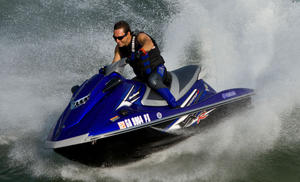 Getting the most out the VXR will require a lot of time on the water…but it’s more than worth the extra effort.
Getting the most out the VXR will require a lot of time on the water…but it’s more than worth the extra effort.Do it wrong, however, especially at top speed, and be ready for a little good old-fashioned, pucker-inducing fear. While keeping the throttle pinned (as I imagine a lot of performance enthusiasts will do on this boat) I experienced the hull occasionally break away at the apex of a corner, unexpectedly drifting outside the turn until I learned to keep it planted. At full speed, it’s a little disconcerting.
Still, I’ll chalk up that split personality to part of the learning curve. Unlike most of today’s couches, the VXR is very susceptible to weighting and body placement. If you’re taller, or ride the boat a little more towards the stern, it hooks up with a vengeance. Move that center of gravity a little more forward, however, and you occasionally lose the edge. I actually got the best results by chopping the throttle just slightly before entering a turn to drop the nose, then jumping back on the gas and powering through. With this method, I could literally turn the boat as tight as I could hang on. The hull also seems to like to stay flatter than many of the lean-in styles we’ve become accustomed to as of late. Plant a foot toward the stern on the outside to gain additional traction.
Or, stand up. Out of the saddle, I experienced no surprises, as the hull tracked with absolute precision. Again, I’d say it’s an issue of weight distribution, as I place my feet a little further back when standing. Either way, expect a workout if you’re trying to push the envelope.
Back To Basics
Of course, there’s also little to distract you along the way. This is meant to be a simple craft, and as such you’ll find no trim or handlebar tilt, and certainly no electronic throttle control enhancements. In a way it adds to the ride, as you don’t have to really think about anything except squeezing the throttle, turning the bars, and hanging on.
Yes, there are a few extras. A standard reboarding step and the remote transmitter that can be used for both security and to activate a low RPM mode are both present on the VXR. Beyond that, however, this boat is distilled down to the essence of a personal watercraft.
Yes, it demands a lot more from its rider. I imagine more casual cruising types will want to look elsewhere. But it also offers a continuing return on the effort invested by the rider.
In that way, it’s a lot more than just a one-trick pony.
| 2010 Yamaha VXR Specs | |
| Length | 128.7 inches |
| Beam | 46.1 inches |
| Curb Weight | 728 lbs |
| Engine | Four-cylinder DOHC EFI |
| Displacement | 1,812 cc |
| Bore and Stroke | 86mm x 78mm |
| Compression Ratio | 11.0:1 |
| Rated Horsepower | 180 (Estimated) |
| Fuel Capacity | 15.9 gal. |
| Combined Stowage Capacity | 15.1 gal. |
| Colors | Metallic Racing Blue; Silver Metallic |
| Price | $11,199 |
Related Reading
2011 Yamaha VXS/VXR Preview
Yamaha unveils new VXR and VXS
2010 Yamaha FZR Review
2010 Yamaha VX Deluxe Review
2010 Yamaha VX Sport Review
Get PersonalWatercraft.com in your Inbox!
Like PersonalWatercraft.com on Facebook
Comments
Most Popular
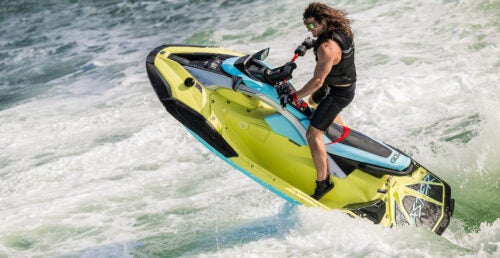
2025 Yamaha JetBlaster PRO 2-Up Review
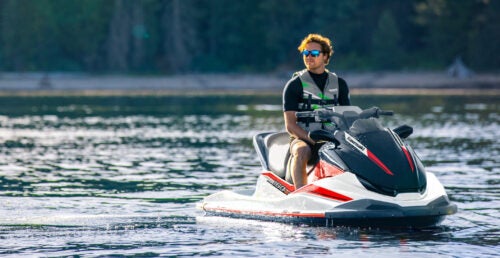
2024 Kawasaki Jet Ski STX 160X Review
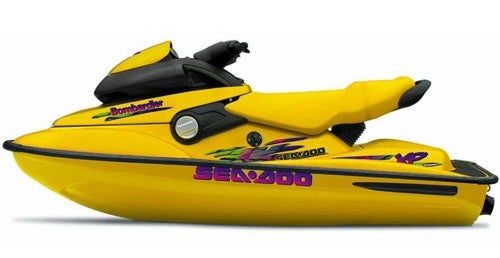
Remembering the Sea-Doo XP

Whatever Happened to the Wetbike?
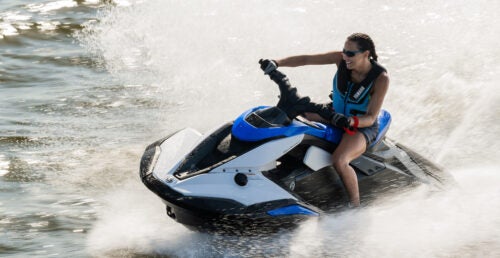
2025 Yamaha JetBlaster Review

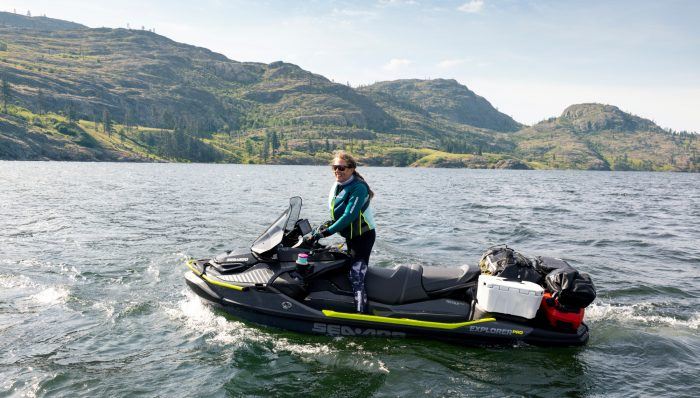
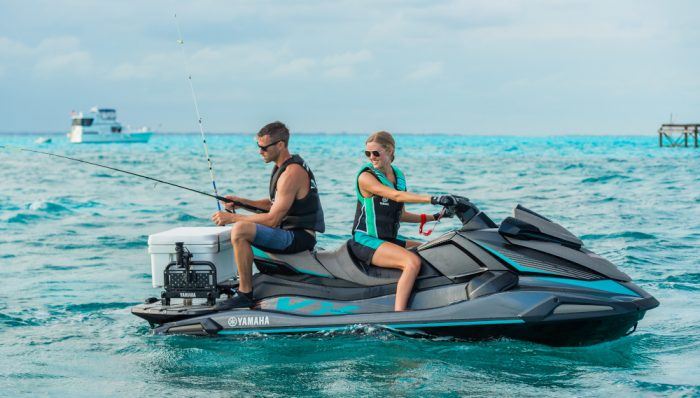

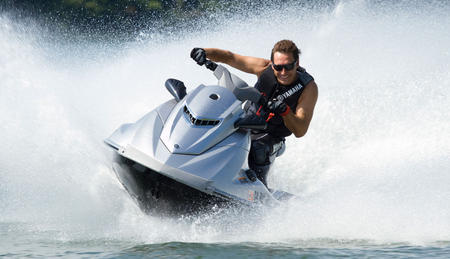
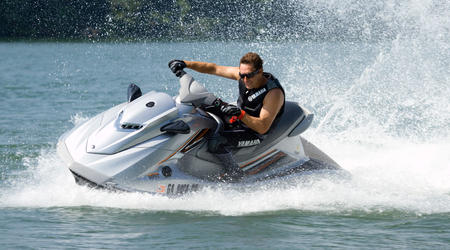
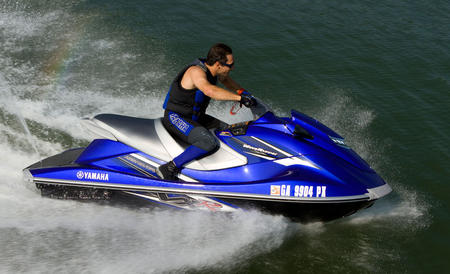
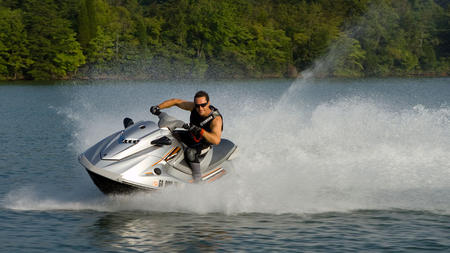



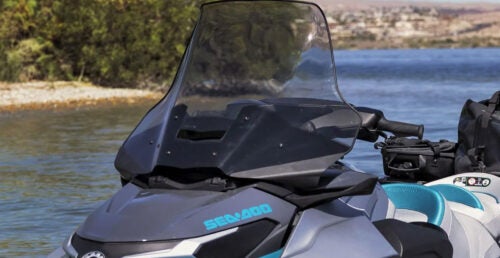



 Your Privacy Choices
Your Privacy Choices